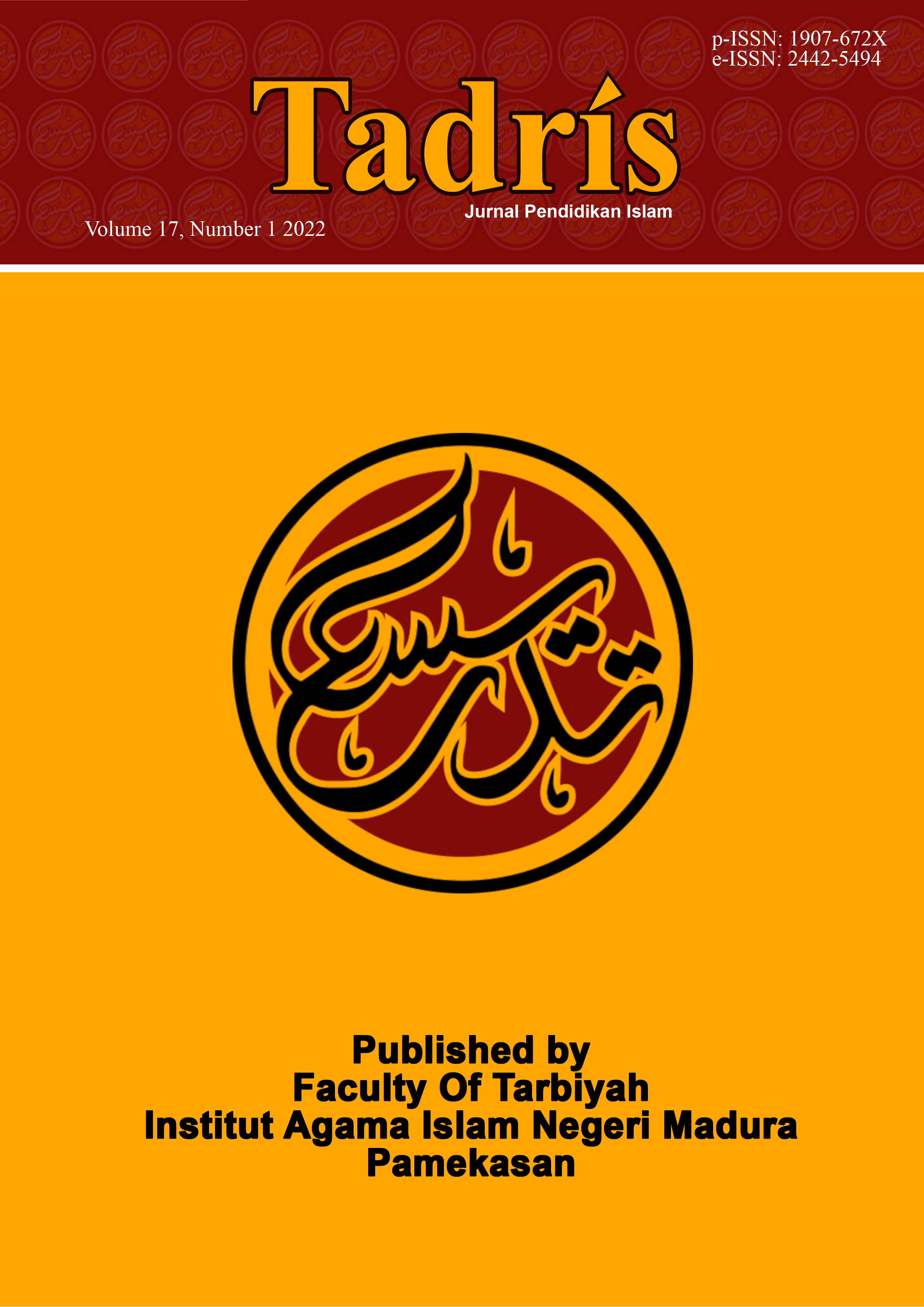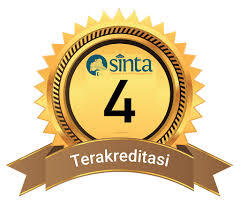Study of Servant Leadership in Building Educational Organizational Commitment at SDIT ABFA
 Abstract views: 700
,
Abstract views: 700
,
 PDF downloads: 493
PDF downloads: 493
Abstract
Leadership style as an integral part of the leadership process has a close relationship with the commitment built within the organization. This commitment will arise when a leader is able to provide good service (servant) for his subordinates. This research method is qualitative with case study type. Data and data sources were obtained from informants at the SDIT ABFA Pamekasan institution through interview, observation, and documentation techniques. The results of this study indicate that the servant leadership style shown by the principal has a fairly good impact on the commitment of teachers and education personnel at SDIT ABFA Pamekasan. The servant leadership style is carried out by providing academic, supervision and administrative services in the school environment. Meanwhile, efforts and strategies to increase work commitment are carried out by establishing persuasive communication, creating a harmonious atmosphere in the school environment, and providing rewards for the achievements of subordinates
Downloads
References
Agustina, Putri. “Karakteristik Perilaku Kepemimpinan Kepala Sekolah Dan Budaya Sekolah Di Sekolah Dasar”, Jurnal Pendidikan Karakter, Vol. 2, No. 9, (Oktober, 2018).
Ammons, David Neal & Thomas Chalmers McLaughlin, “Discovering Servant Leader Relations with New Followers in Nonprofit Organizations: Does a Servant Leader Always Serve First?”, Open Journal of Leadership, Vol.6, No.2, June 19, 2017, diakses di https://www.scirp.org/(S(351jmbntvnsjt1aadkposzje))/journal/paperinformation.aspx?paperid=76966
Ananda, Susi & Hendri Winata, “Upaya Meningkatkan Komitmen Organisasi Melalui Perilaku Kepemimpinan”, Jurnal Pendidikan Manajemen Perkantoran, Vol. 2, No.1, (Januari, 2017).
Andi Ilham Muchtar dkk, “Pengaruh Keharmonisan Keluarga dan Lingkungan Sekolah Terhadap Prestasi Belajar Bidang Studi Sosiolog”,
Choliq, Abd., “Kepemimpinan yang Melayani (Servant Leadership) Sebagai Gaya Kepemimpinan Kekinian”, Kementrian Keuangan Republik Indonesia, Diakses di https://www.djkn.kemenkeu.go.id/kpknl-palu/baca-artikel/13049/Kepemimpinan-yang-Melayani-Servant-Leadership-Sebagai-Gaya-Kepemimpinan-Kekinian.html
Febianti, Yopi Nisa. “Peningkatan Motivasi Belajar dengan Pemberian Reward and Punishment yang Positif”, Jurnal Edunomic, Vol. 6, No. 2, (2018).
Jamilah H. Ali, “Peran Kepala Sekolah Sebagai Supervisor Dalam Meningkatkan Mutu Pembelajaran Guru Mata Pelajaran IPA Pada SDN Roja 1 Ende”, Jurnal Dinamika Sains, Vol. 3, No. 1, (2019).
Kurniawan, Thomas. “Pengaruh Servant Leadership Terhadap Kinerja Karyawan di PT. Tata Mulia Nusantara Indah dengan Persepsi Budaya Organisasional sebagai Mediasi”, Jurnal AGORA, Vol. 7, No. 1, (2019).
Michiel Frederick Coetzer, “The Functions of a Servant Leader”, MDPI: Adm. Sci. 2017, 7, 5; doi:10.3390/admsci7010005, 6.
Mira, Wike Santa & Meily Margaretha, “Pengaruh Servant Leadership Terhadap Komitmen Organisasi dan Organization Citizenship Behavior”, Jurnal Manajemen, Vol. 11, No. 2, (Mei, 2012).
Putrant, Dwi, dkk, “Peran Kepala Sekolah dalam Implementasi Program Bimbingan dan Konseling di Sekolah”, Jurnal Prakarsa Paedagogia, Vol. 3 No. 2, (Desember, 2020).
Rahardjo, Susilo & Gudnanto, Pemahaman Individu Teknik Non Tes. Kudus: Nora Media Enterprise, 2011.
Rusdin, “Pendidikan dan Pelatihan Sebagai Sarana Peningkatan Kompetensi Guru di SMP Negeri 02 Linggang Bigung”, Jurnal Administrative Reform, Vol. 5, No. 4, Desember (2017).
Sari, Eliana. dkk, “Meningkatkan Komitmen Guru Melalui Optimalisasi Kepemimpinan Kepala Sekolah”, Jurnal Jendela Pendidikan, Vol. 01, No. 04 November (2021).
Setiawan, Rahmat. “Hubungan Kepemimpinan Karismatik, Kepemimpinan Transformasional Dan Kepemimpinan Transaksional Dengan Kinerja Bawahan”, Jurnal Ekonomi dan Bisnis UNAIR, No. 3 (Desember, 2014).
Smith, Carol. Servant leadership: The Leadership Theory of Robert K. Greenleaf, Info 640 – mgmt. of info. Orgs, Submitted december 4, 2005, 3. Diakses di https://www.boyden.com/media/just-what-the-doctor-ordered-15763495/Leadership%20%20Theory_Greenleaf%20Servant%20Leadership.pdf
Sodiah, “Etika Kerja Kepala Sekolah Dalam Meningkatkan Kinerja Guru”, TADBIR : Jurnal Studi Manajemen Pendidikan, Vol. 1, No. 2, (2017).
Soliha, Euis & Hersugondo, “Kepemimpinan Yang Efektif Dan Perubahan Organisasi”, Jurnal (FE) Fokus Ekonomi, Vol. 7, No. 2, (Agustus, 2008).
Sukardi, Metodologi Penelitian Pendidikan: Kompetensi dan Praktiknya. Jakarta: Bumi Aksara, 2020.
Syafrida, “Kepemimpinan Kepala Sekolah”, Manajer Pendidikan, Vol. 9, No. 5, (November, 2015).
Syamsul, Herawati. “Penerapan Kepemimpinan Kepala Sekolah Dalam Meningkatkan Kinerja Guru Pada Jenjang Sekolah Menengah Pertama (SMP)”, Jurnal Idaarah, Vol. I, No. 2, (Desember, 2017).
Wawancara dengan Ahmad Ridhoie, S.Pd.I, sebagai Guru Bahasa Arab, 08 Desember 2021 Pukul 09.30 WIB
Wawancara dengan Fatmawati, S.Pd.I sebagai Guru PAI, 07 Desember 2021 Pukul 10.00 WIB
Wawancara dengan Hefni, S.Pd sebagai Kepala Sekolah, 06 Desember 2021 Pukul 08.00 WIB
Wawancara dengan Rihanah, S.Pd sebagai Guru Bahasa Inggris, 07 Desember 2021 Pukul 11.30 WIB
Yuliani, Tri. & Muhammad Kristiawan, “Peran Kepemimpinan Kepala Sekolah Dalam Membina Kompetensi Sosial (Pelayanan Prima) Tenaga Administrasi Sekolah” JMKSP: Jurnal Manajemen, Kepemimpinan, dan Supervisi Pendidikan, Vol. 1, No. 2, Juli-Desember (2016)
Zahra, Nina. “Pengaruh Gaya Kepemimpinan Teradap Komitmen Organisasi Melalui Aspek Kepuasan Kerja Karyawan dan Kepercayaan Pada Sektor Perbankan”, Jurnal Manajemen dan Pemasaran Jasa, Vol. 8, No.1, (2015), 155.
Copyright (c) 2022 TADRIS: Jurnal Pendidikan Islam

This work is licensed under a Creative Commons Attribution-NonCommercial 4.0 International License.
The journal operates an Open Access policy under a Creative Commons Non-Commercial 4.0 International license. Authors who publish with this journal agree to the following terms:
- Authors retain copyright and grant the journal right of first publication with the work simultaneously licensed under a
 Commons Attribution-NonCommercial 4.0 International License
Commons Attribution-NonCommercial 4.0 International Licensethat allows others to share — copy and redistribute the material in any medium or format, and adapt — remix, transform, and build upon the material.
- Authors are able to enter into separate, additional contractual arrangements for the non-exclusive distribution of the journal's published version of the work (e.g., post it to an institutional repository or publish it in a book), with an acknowledgement of its initial publication in this journal.
- Authors are permitted and encouraged to post their work online (e.g., in institutional repositories or on their website) prior to and during the submission process, as it can lead to productive exchanges, as well as earlier and greater citation of published work (see The Effect of Open Access).














